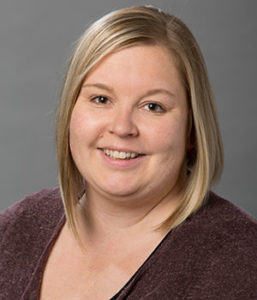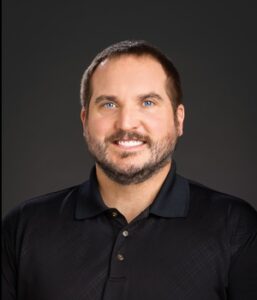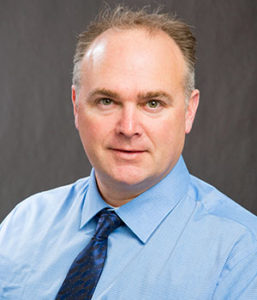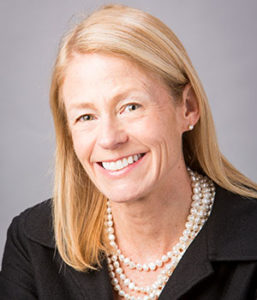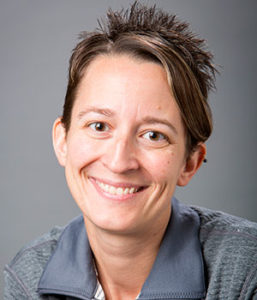Accelerated BS Kinesiology/MS Athletic Training BS & MS
The athletic trainer is a health care professional who renders service or treatment, under the direction of or in collaboration with a physician, in accordance with their education and training, and the state’s statutes, rules and regulations.
As a part of the health care team, services provided by athletic trainers include primary care, injury and illness prevention, wellness promotion and education, emergent care, examination and clinical diagnosis, therapeutic intervention, and rehabilitation of injuries and medical conditions.
Program Type
Accelerated Graduate
Program Format
On Campus
Athletic Trainers…
“collaborate with physicians in the prevention, emergency care, clinical diagnosis, therapeutic intervention and rehabilitation of injuries and illnesses.”
– National Athletic Trainers’ Association
Your work will take you to a wide variety of settings, including colleges and universities, hospitals and physician offices, performing arts and professional sports, occupational health settings, secondary schools, and military and public safety environments.
Your clients will come from all walks of life and from all age groups.
If athletic training sounds like a good fit for you, please read the National Athletic Trainers’ Association infographic “So you want to become an athletic trainer?”
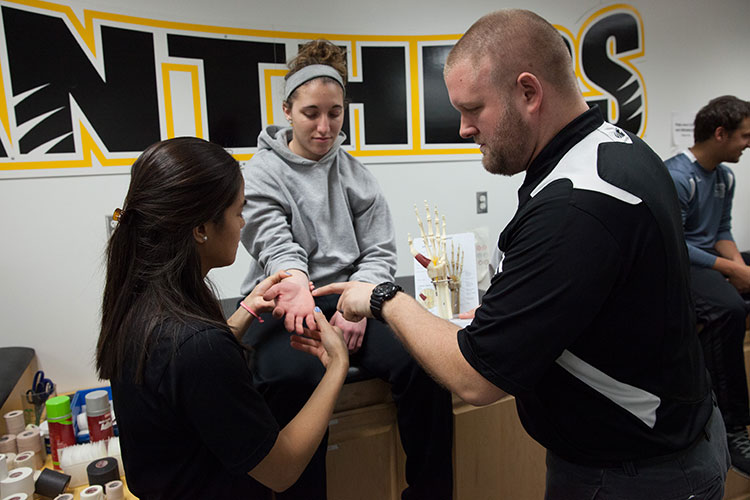
Certified athletic trainers are health care professionals who specialize in preventing, recognizing, managing and rehabilitating injuries in physically active individuals. With our athletic trainer degree program, you will complete three years as an undergraduate student, then begin the MS Athletic Training program as a graduate student. At the end of your fourth year (your first year in MSAT), your BS Kinesiology degree will be granted.
After year two as a graduate student, you will earn your MS Athletic Training degree. Please refer to the Accelerated Master’s Degree page for additional information and updates.
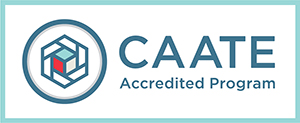
The Master of Science in Athletic Training program is accredited by the Commission on Accreditation of Athletic Training Education (CAATE). UWM received initial accreditation in 2003 for the Bachelor of Science in Athletic Training program, and was approved for degree change in December 2016. In Fall of 2017 the program completed a comprehensive accreditation review, and was reaccredited for the maximum 10 year period. The next comprehensive review will occur in the 2027-2028 academic year.
CAATE Program Information and Outcomes Page
Employment Outlook
Earnings
Athletic trainers working in full-time positions typically receive a salary and benefits. The salary depends on the education and experience of the athletic trainer and also on the setting in which the individual is working. According to the U.S. Bureau of Labor Statistics, the median annual income of athletic trainers in Wisconsin is $50,180, compared to the national average income of $48,440. The National Athletic Trainers’ Association (NATA) provides estimates of salary by experience level, education and job setting based on a membership survey conducted every two years. The 2018 NATA Salary Survey (PDF) indicated a national average salary of $57,203.
Expected Growth
According to the U.S. Bureau of Labor Statistics, employment of athletic trainers is projected to grow 16 percent from 2019 to 2029, much faster than the average for all occupations.
Projections from the Wisconsin Department of Workforce Development indicate that from 2020-2028, there will be a 10% increase in the number of athletic training jobs in the state of Wisconsin, and a 9% increase in the greater Milwaukee area (Milwaukee, Ozaukee, Waukesha and Washington counties). This exceeds the overall increase in health care practitioner positions (5%), indicating that athletic training continues as a strong area of growth in the health care professions.
Competition is expected for positions with collegiate or professional sports teams. These settings are expanding their services to physically active youth and adult populations. The demands for services will continue to expand beyond traditional “sport-related” roles to include exercise and reconditioning, on-site occupational health, on-site injury prevention, and fitness and wellness. As our society continues to age and increase its focus on health and physical activity, the role of the athletic trainer is likely to increase proportionally. The athletic trainer is able to provide a diverse perspective in the prevention and treatment/rehabilitation of physical activities across our diverse and aging population.
Competition for well-trained professionals with recognized degrees in the field, relevant experience, and certifications beyond minimal requirements are likely to drive salaries and positions in this industry. According to the National Athletic Trainers’ Association, almost 70 percent of athletic trainers have a master’s degree or higher. Athletic trainers may need a master’s or higher degree to be eligible for some positions, especially those in colleges and universities, and to increase their advancement opportunities. Because some positions in high schools involve teaching along with athletic trainer responsibilities, a teaching certificate or license could be required.
Sources: 2018 NATA Salary Survey (PDF); Bureau of Labor Statistics, U.S. Department of Labor, Occupational Outlook Handbook, Athletic Trainers.
Successful Alumni
The School of Rehabilitation Sciences & Technology has many successful alumni. These alumni have taken their Athletic Training, Communication Sciences & Disorders, Occupational Therapy, Sciences & Technology and Physical Therapy educations and have excelled in their careers.
Visit our Alumni page and be inspired by where a health sciences degree can take you.
This athletic trainer degree program involves the following bachelor’s and master’s degrees: Kinesiology BS and Athletic Training MS. There are 6 forward double-counted credits and 28 backward double-counted credits for a total of 34 double-counted credits.
Eligible Forward Double-Counted Courses
Six (6) graduate-level credits taken in undergraduate status may forward double-count toward the Athletic Training MS. ·
- KIN 550G Psychological Aspects of Human Movement 3
- KIN 551G Psychology of Injury/Illness/Disease: Implications and Strategies for Rehabilitation 3
Eligible Backward Double-Counted Courses
Twenty-eight (28) graduate credits may be backward double-counted toward the Kinesiology BS.
- ATRAIN 725 Gross Anatomical Kinesiology 3 ·
- ATRAIN 710 Prevention & Care of Emergent Medical Conditions in Athletic Training 4
- ATRAIN 701 Introduction to Clinical Education and Professional Development 1
- ATRAIN 785 Clinical Education in Athletic Training: I 1
- ATRAIN 747 Clinical Exam and Diagnosis of the Lower Extremity in Athletic Training 3
- ATRAIN 757 Found of Therapeutic Intervention in Athletic Training 3
- ATRAIN 726 Pathoetiology of Tissue Injury 1
- ATRAIN 702 Ethics in Healthcare 1
- ATRAIN 703 Foundations of Interprofessional Practice 1
- ATRAIN 786 Clinical Ed in Athletic Training: II 2
- ATRAIN 748 Clinical Exam and Diagnosis of the Head and Spine in Athletic Training 3
- ATRAIN 753 Medical Physiology II 3
Download the Accelerated Bachelor of Science in Kinesiology/Master of Science in Athletic Training Program of Study (PDF) to plan your athletic trainer degree coursework.
Freshman Admission
To apply to the athletic trainer degree program, you must first apply to UWM. On your application, select “Accelerated BS Kinesiology/MS Athletic Training” as your intended area of study. You will be classified as “Accelerated BS Kinesiology/MS Athletic Training-Intended” upon admission to the university.
Advancement to Junior Standing
In order to forward count undergraduate courses toward the master’s degree, you must meet the following criteria to be permitted to enroll in undergraduate courses at the graduate level during your junior year:
- Have a minimum UWM cumulative grade point average (GPA) of 3.0.
- Completion of all General Education Requirements (GERs).
- Completion of the following prerequisite courses with a grade of “C” or better or be in progress at the time of application submission:
- PSYCH 101 Introduction to Psychology
- BIO SCI 150 Foundations of Biological Science
- BIO SCI 202: Anatomy & Physiology I
- BIO SCI 203: Anatomy & Physiology II
- CHEM 100: Chemical Science
- KIN 270: Statistics in the Health Professions
- PHYSICS 120: General Physics I
- PHYSICS 121: General Physics I Lab
If you do not meet these criteria in the junior year, you may apply to the BS Kinesiology major by satisfactorily meeting the admissions criteria.
Professional Phase Admission
Admission to the UWM Graduate School and the professional phase of the MS Athletic Training program is selective and occurs in November of the junior year. In order to be considered for admission to the professional phase of the accelerated program, you must meet the following requirements:
- Write an essay explaining your interest in the athletic training profession.
- Have a minimum cumulative grade point average (GPA) of 3.0.
- Complete the following prerequisite courses with a grade of “C” or better, or be in progress at the time of application submission:
- KIN 320: Biomechanics
- KIN 330: Exercise Physiology
- NUTR 235: Nutrition for Health Professions
- Completion of 20 hours of observation of athletic training practice with a certified athletic trainer within 12 months of application submission. This requirement can be met in the KIN 212 Fieldwork in Athletic Training course.
- Two letters of recommendation attesting to your maturity and suitability for graduate education in a health profession. One letter must be an academic reference, the other letter must be from the athletic trainer with whom you completed the majority of your observation hours.
- Completion of an interview with the MS Athletic Training Admissions Committee.
If you are not selected for the accelerated MS Athletic Training professional phase, you will be accepted into the BS Kinesiology major, provided you meet the admissions criteria. After completion of the junior year of coursework in the accelerated program, you will only need 28 additional credits for the BS Kinesiology degree. The two undergraduate courses taken in the junior year (KIN 550, 551) will count toward these 26 credits. Only two additional semesters of study as a full-time student will be needed to complete the BS Kinesiology degree.
Matriculation Requirements
Once admitted to the program, students must complete the following to enroll in the university and program.
1. Criminal Background Check
The university is required to perform a criminal background check on students prior to beginning the program. Consistent with Wisconsin’s Caregiver Background Law, individuals with certain convictions may be disqualified from working in hospitals and other health care or care facilities. Such individuals may also be denied national certification and licensure. More information about the Caregiver Background Law is available at: http://www.dhs.wisconsin.gov/caregiver/index.htm.
If you have a criminal conviction in your background, it may affect your ability to work in certain facilities or obtain certification and licensure. The inability to be placed in facilities may affect your completion of clinical education requirements and thus degree completion. In addition, the existence of disqualifying convictions under the Caregiver Background Law may also affect your eligibility for certification and licensure, and/or your ability to gain employment in this field. It is the student’s responsibility to notify the program Director if an event occurs while in the program that may change the results of the criminal background check. You should contact the program director as soon as possible to discuss whether you should apply to the program or consider alternative programs.
2. Immunization Verification and Testing
Students must provide a document with proof of immunization dates for the following:
- Tetanus, diphtheria, pertussis (Tdap)
- Tetanus Booster (Td) (within last 10 yrs)
- Measles/Mumps/Rubella (MMR)
- Hepatitis B (HepB) (Or signed refusal)
- Varicella (Positive titer or OR varicella vaccine (VAR))
- Meningococcal (Recommended for students living in the dormitories, but not required)
- COVID-19 (Recommended for all students; required by some clinical education sites)
- Two-step TB Skin test ( a “one step” TB test is NOT sufficient to meet this requirement) (required before July 1)
- 10 panel urine drug test (required before July 1)
- Influenza vaccine (required before October 15)
3. Technical Standards and Physical Examination
Prior to beginning the program, students must provide proof of a physical examination being completed within the past year. One reason for the physical examination is to have a licensed and qualified health care provider verify that, to the best of his/her ability based on a routine physical examination, the student meets the Technical Standards for Athletic Training Students (with or without reasonable accommodation). The Technical Standards for Athletic Training Students-Healthcare Provider Verification form must be signed by the person who administered the physical exam within the last year. Students must have a physical examination completed annually (at the Norris Student Health Center or from a provider of choice). Any changes in health status that may affect the student’s ability to meet the technical standards must be disclosed to the program director immediately.
Undergraduate students who have declared an intent to pursue the athletic trainer degree program are advised by Torry Rufer, the BS Kinesiology Academic Advisor. Contact Torry at 414-229-2758 or tjrufer@uwm.edu.
Graduate students applying to and admitted by the UWM Graduate School as part of the athletic trainer degree program are advised by the Athletic Training Program Director, Jennifer Earl-Boehm. Contact Jennifer Earl-Boehm at 414-229-3227 or jearl@uwm.edu.
When should I meet with my advisor?
You are encouraged to meet with your advisor at least once per semester to ensure timely progress to graduation.
- Enrolling for spring semester?
Schedule an appointment with your advisor in October or November. - Enrolling for fall semester?
Schedule an appointment with your advisor in March or April.
You are also welcome to schedule an appointment with your advisor at any time to discuss academic challenges, career opportunities or any other questions.
How can my advisor help me?
The College of Health Sciences boasts professional academic advisors who understand the challenges of balancing academics, work, family and the social aspects of college life. Advisors partner with you to:
- Explore your academic and career interests
- Plan the sequence of your courses
- Prepare for course enrollment
- Access tutoring and other academic support
- Identify opportunities for campus involvement
- Connect you to campus resources
- Plan for graduation
- Associate Professor, Athletic Training & Sports Psychology
- Program Coordinator, Rehabilitation Sciences MS
- Program Coordinator, Certified Mental Performance Consultant, Graduate Certificate
- arvinenb@uwm.edu
- 414-251-7428
- Pavilion 370
- Clinical Assistant Professor, Athletic Training & Sports Psychology
- doeringa@uwm.edu
- 414-977-7768
- Pavilion 372
- Program Director, Athletic Training & Sports Psychology
- Executive Committee Chair
- Associate Professor, Athletic Training & Sports Psychology
- jearl@uwm.edu
- 414-229-3227
- Pavilion 367
- Professor, Athletic Training, Physical Therapy
- ebersole@uwm.edu
- 414-229-6717
- Pavilion 364
- Professor, Athletic Training & Sports Psychology
- Laboratory Director, Laboratory for Sport Psychology& Performance Excellence
- bbmeyer@uwm.edu
- 414-251-6393
- Pavilion 369
- Clinical Assistant Professor, Athletic Training & Sports Psychology
- Clinical Education Coordinator, Athletic Training
- manofsky@uwm.edu
- 414-251-7246
- Pavilion 368

